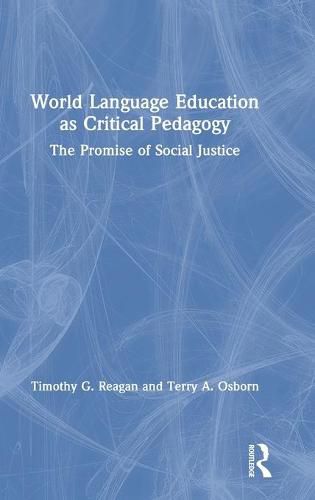Readings Newsletter
Become a Readings Member to make your shopping experience even easier.
Sign in or sign up for free!
You’re not far away from qualifying for FREE standard shipping within Australia
You’ve qualified for FREE standard shipping within Australia
The cart is loading…






Accessible and cutting-edge, this text is a pivotal update to the field and offers a much-needed critical perspective on world language education. Building off their classic 2002 book, The Foreign Language Educator in Society, Timothy G. Reagan and Terry A. Osborn address major issues facing the world language educator today, including language myths, advocacy, the perceived and real benefits of language learning, linguistic human rights, constructivism, learning theories, language standards, monolingualism, bilingualism and multiculturalism.
Organized into three parts - Knowing Language,
Learning Language, and Teaching Language - this book applies a critical take on conventional wisdom on language education, evaluates social and political realities, assumptions, and controversies in the field. Each chapter includes questions for reflection and discussion to support students and educators in developing their own perspectives on teaching and learning languages. With a critical pedagogy and social justice lens, this book is ideal for scholars and students in foreign/world language education, social justice education, and language teaching methodology courses, as well as pre- and in-service teachers.
$9.00 standard shipping within Australia
FREE standard shipping within Australia for orders over $100.00
Express & International shipping calculated at checkout
Accessible and cutting-edge, this text is a pivotal update to the field and offers a much-needed critical perspective on world language education. Building off their classic 2002 book, The Foreign Language Educator in Society, Timothy G. Reagan and Terry A. Osborn address major issues facing the world language educator today, including language myths, advocacy, the perceived and real benefits of language learning, linguistic human rights, constructivism, learning theories, language standards, monolingualism, bilingualism and multiculturalism.
Organized into three parts - Knowing Language,
Learning Language, and Teaching Language - this book applies a critical take on conventional wisdom on language education, evaluates social and political realities, assumptions, and controversies in the field. Each chapter includes questions for reflection and discussion to support students and educators in developing their own perspectives on teaching and learning languages. With a critical pedagogy and social justice lens, this book is ideal for scholars and students in foreign/world language education, social justice education, and language teaching methodology courses, as well as pre- and in-service teachers.